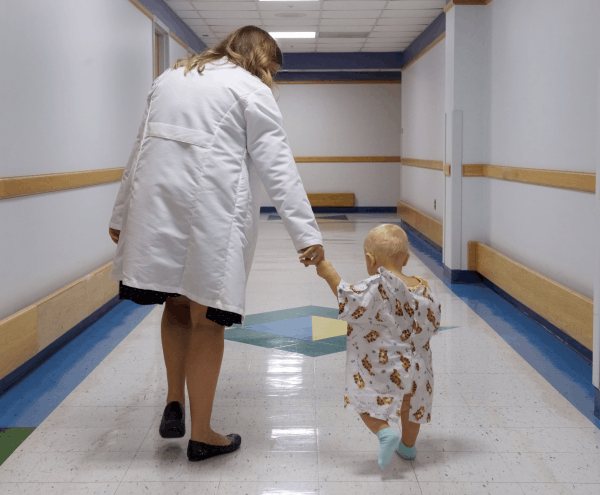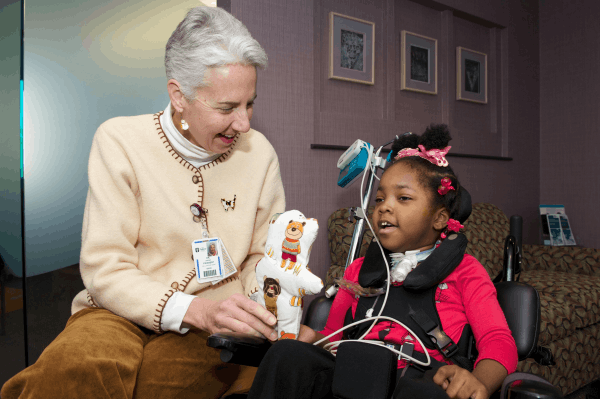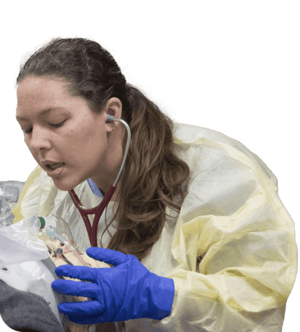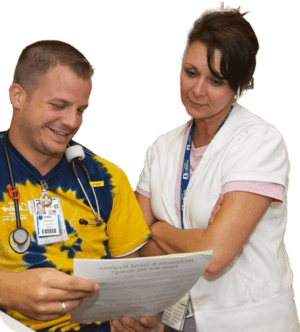Pediatric Palliative Care Fellowship
This fellowship works with these departments and clinics:
Our 1-year ACGME-accredited Pediatric Palliative Care Fellowship Program exposes you to patients with a variety of conditions and socioeconomic and cultural backgrounds. You will receive training in inpatient, outpatient and community settings, and your training experience includes a consultation model, longitudinal care of patients and families, collaboration with an interdisciplinary team, and exposure to bereavement support.
A 2nd non-accredited fellowship year devoted to pediatric palliative care research (see tab on this page) will be available as of the 2019-20 academic year.

What They‘re Saying…
“The autonomy with guidance that is provided by the attendings allowed me to develop management plans and build strong relationships with my patients and their families. The support team of APPs, social workers, psychologists, pharmacists, nurse clinicians (and many more) are also very invested in the education of the fellows, and this team really does make the sometimes long hours more enjoyable as we are finding our way through fellowship.”
— Matthew Henderson, MD, Hematology-Oncology Fellowship
Upon completion of our pediatric palliative care fellowship program, you will demonstrate these core competencies:
- Patient care that is compassionate, appropriate and effective for the treatment of health problems and the promotion of health
- Medical knowledge about established and evolving biomedical, clinical and cognate (e.g., epidemiological and social-behavioral) sciences and the application of this knowledge
- Practice-based learning and improvement that involves investigation and evaluation of your own patient care, appraisal and assimilation of scientific evidence, and improvements in patient care
- Interpersonal and communication skills that result in effective and age-appropriate information exchange and teaming with patients, their families and other healthcare professionals
- Professionalism as manifested through a commitment to carrying out professional responsibilities, adherence to ethical principles, and sensitivity to a diverse patient population
- Systems-based practice as manifested by actions that demonstrate an awareness of and responsiveness to the larger context and system of healthcare and the ability to effectively call on system resources to provide care that is of optimal value
What sets our program apart:
- Education-Centered Team: Our extensive, dedicated interdisciplinary team places fellow education at the forefront, ensuring your learning takes priority over service obligations
- Comprehensive Patient Exposure: Our robust patient population spans from prenatal through adult patients, providing exceptional breadth of clinical experience across the full spectrum of palliative care
- 24/7 Service Model: While more demanding, our round-the-clock service ensures continuity of care and provides in-depth exposure to every aspect of palliative care you'll encounter in professional practice
- Established Program Integration: Our experienced team has significant tenure and is fully embraced throughout the enterprise and community, eliminating barriers to consultation and ensuring seamless collaboration
- Wellness-Focused Culture: We prioritize both team and fellow wellness through comprehensive support systems and a robust, integrated curriculum designed for sustainable practice
- Strong Academic Foundation: Our significant academic profile and extensive research agenda provide rich opportunities for scholarly development and contribution to the field

Application Process for Pediatric Palliative Care Fellowship
To apply to our pediatric palliative care fellowship program, you must complete an application with the Electronic Residency Application Service (ERAS). We accept applications July 1 - October 1 for the following year. We usually begin interviewing candidates in August.
To learn more, contact:
Cathy Kelly-Langen, MD
Pediatric Palliative Care Fellowship Director
Akron Children's
Ckelly-langen@akronchildrens.org
330-543-3343
Or
Sarah Friebert, MD
Pediatric Palliative Care Fellowship Associate Director
Akron Children's
sfriebert@akronchildrens.org
330-543-3343
As a pediatric palliative care fellow, you will be given the opportunity to provide ongoing care with the responsibility for decision-making and management, as well as consultative care for patients in all settings. This will foster the acquisition of assessment and management skills necessary for the evaluation and care of patients with complex palliative care needs.
You will see at least 100 new patients during the yearlong training, and will follow at least half of these patients longitudinally across all settings.
Our program includes a didactic component focused on the epidemiology and pathophysiology of progressive chronic illnesses in pediatric patients, the management of these diseases in all settings, and the multiple issues associated with death and dying.
We will attend to the physical, behavioral, psychological, social and spiritual aspects of illness. We will emphasize communication and team-building skills. We will address all issues routinely covered by an interdisciplinary team, such as socioeconomic factors, cultural and ethical diversity, religious background, and ethical and legal implications of practice decisions.
Your training will cover issues of regulatory compliance and quality improvement, as well as awareness of the potential for personal and family growth at the time of terminal illness.
We encourage and facilitate professional self-care. We also address basic concepts of program management, financing for different care settings, and public policy/advocacy.
Inpatient Setting
- Consultative service and principal care management, including longitudinal follow-up
- Interdisciplinary team management approach to patients with acute medical and/or psychosocial problems
- Home visits to see patients in the palliative care program (personal transportation and up-to-date insurance coverage mandatory)
- Phone calls taken from home on a rotating basis with an exception of the need to provide in-hospital consultation and services as requested
Hospice/Home Care
- Meaningful participation in patient care at one or more Medicare-certified hospice programs with hospice medical directors certified by the American Board of Hospice and Palliative Medicine
- Provision of care to patients who may require the services of multiple disciplines, including nursing, social work, pastoral care and bereavement counseling
- Provision of continuing care and coordination to implement recommendations from the interdisciplinary team
- Involvement in hospice interdisciplinary team meetings
- Exposure to organizational and administrative aspects of home health care and/or hospice programs
- Minimum of 25 home visits required through the hospital program, hospice home care or home health care
Long-Term Care
- One month minimum is spent in one or more long-term care institutions, such as a skilled nursing facility or chronic care hospital
- You will contribute to the care of the institution’s residents through the provision of principal care or involvement in a consultative team, specialty clinic or dedicated unit
Emphasis during this longitudinal experience focuses on:
- Approach to diagnosis and treatment of the chronically ill patient (including acute care needs) in a less technologically sophisticated environment than the acute-care hospital
- Working within the limits of a decreased staff-to-patient ratio compared with acute-care hospitals
- Greater awareness of and familiarity with hospice and palliative medicine in this setting
- The challenge of the clinical and ethical dilemmas that occur when caring for children with life-threatening illness
Outpatient Care
- Provide relevant palliative intervention in outpatient care setting
- Participate in the care of a panel of patients, following them across multiple care settings
- Home visits to see patients in the palliative care program (personal transportation and up-to-date insurance coverage mandatory)
Electives
- You may spend at least o4 weeks of elective time in a clinically relevant field, including experiences in ethics consultations, pulmonary, cardiology or neurology clinics, etc.
Conferences
- You will participate as both a learner and teacher in conferences or seminars/workshops in palliative medicine to augment your clinical experience, foster interaction, and develop skills in interpreting medical literature. As you progress through your training, opportunities will arise to teach staff such as nurses, allied health professionals, medical students and/or other residents.
Research and Quality Improvement
Palliative care research spans a broad spectrum, from molecular biology to health and social policy. Our research capabilities and resources are broad as well as our connections with others performing research.
Fellows are expected to perform scholarly activity which could include a research project or quality improvement project during the 1-year training program. We also encourage you to participate in ongoing research and/or develop an independent research project in some aspect of clinical care or education related to palliative care.
Specific Responsibilities
In addition to serving patients and families in the above areas and taking rotating call with an attending palliative medicine physician, the fellows are expected to participle in:
- Interdisciplinary palliative care conferences
- Interdisciplinary conference with other divisions in the hospital
- Hospice interdisciplinary team rounds
- Monthly fetal anomalies interdisciplinary conference
- At least one children's grief series
- Hospital remembrance services
Fellows will be required to teach:
- Medical students at local medical schools
- 4th-year medical students during their palliative care elective
- Residents taking an elective in pediatric palliative care
- House staff education in pediatric palliative care

Akron Children’s accredited fellowship programs offer:
Stipends
(Effective July 1, 2025)
PL-4 – $75,794
PL-5 – $77,309
PL-6 -- $78,856
Vacation
House offices are granted 3 weeks of vacation or 15 customary working days.
Conference Time
Fellows are entitled to 5 days of conference time each year for medical conventions and courses outside the hospital.
Educational Allowance
Fellows are provided $1,500 annually for use toward medical-related journals or books, conferences, and license renewals.
Research and Scholarship Travel
The Department of Pediatrics encourages and supports investigator-initiated research by subspecialty fellows. Therefore, the Department supports research-related travel when the fellow is in good academic and professional standing, and when prior written approval of the program director is documented. All hospital policies relating to travel must be followed.
Although the policy relates to presentation at a national forum, requests for support for presentation at a regional forum are considered on a case-by-case basis.
Additionally, funding may be available to offset costs for professional conferences (travel, lodging, registration, meals) if not presenting scholarly activity.
Professional Liability
Professional liability insurance is provided by the hospital.
Health Benefits
Fellows, and their dependents, are eligible to enroll in the hospital’s health, dental, and vision insurance programs. Costs are shared between the fellow and the hospital. Benefits are available immediately.
Retirement Benefits
Fellows may participate in the Hospital’s 403(b) Plan from their date of hire. Match dollars are not available to fellows.
Other Benefits
- Group Term Life Insurance equal to one time the fellow’s annual income, with an option to purchase additional coverage in increments of annual earnings.
- Dependent Life Insurance coverage and Medical Dependent Care Flexible Spending Accounts.
- Voluntary Universal Life, Accident & Critical Illness through Trustmark & Home& Auto through Met Life.
- Employee Assistance Program available to all fellows and their families.
- Short and Long Term Disability benefits available, effective for three months following start date.
Medical License & DEA
Fellows are required to obtain an Ohio State Medical License and DEA certificate prior to beginning training.
Parking
A key access card for convenient parking is provided at no charge.
Lab Coats
One embroidered lab coat is provided, if desired.
Meals
Fellows are given $70 every week for use in the hospital cafeteria.
Relocation expenses
The hospital provides reimbursement for initial relocation expenses, up to $1,000, subject to current tax laws.
Smoke, Electronic Cigarette and Tobacco Free Campus
Akron Children’s is a tobacco-free healthcare system. Prospective employees who test positive for nicotine will have their offer of employment rescinded and will not be permitted to start work.
Research Fellowship
After successful completion of the ACGME-accredited year of pediatric palliative care fellowship, there is an opportunity to pursue an additional year devoted to pediatric palliative care research.
The fellow will engage in an active program of research within the division.
The fellow will participate actively in the creation, development, analysis, and presentation of projects.
The fellow will have the opportunity to pursue additional post-graduate training opportunities, such as a certificate in bioethics or a Masters in public health during the research year.
The Division Director and the division’s dedicated Research Scientist will directly oversee the fellow and his/her projects.
The fellow will have clinical responsibilities interspersed throughout the year to maintain his/her skills.
By using this site, you consent to our use of cookies. To learn more, read our privacy policy.

















